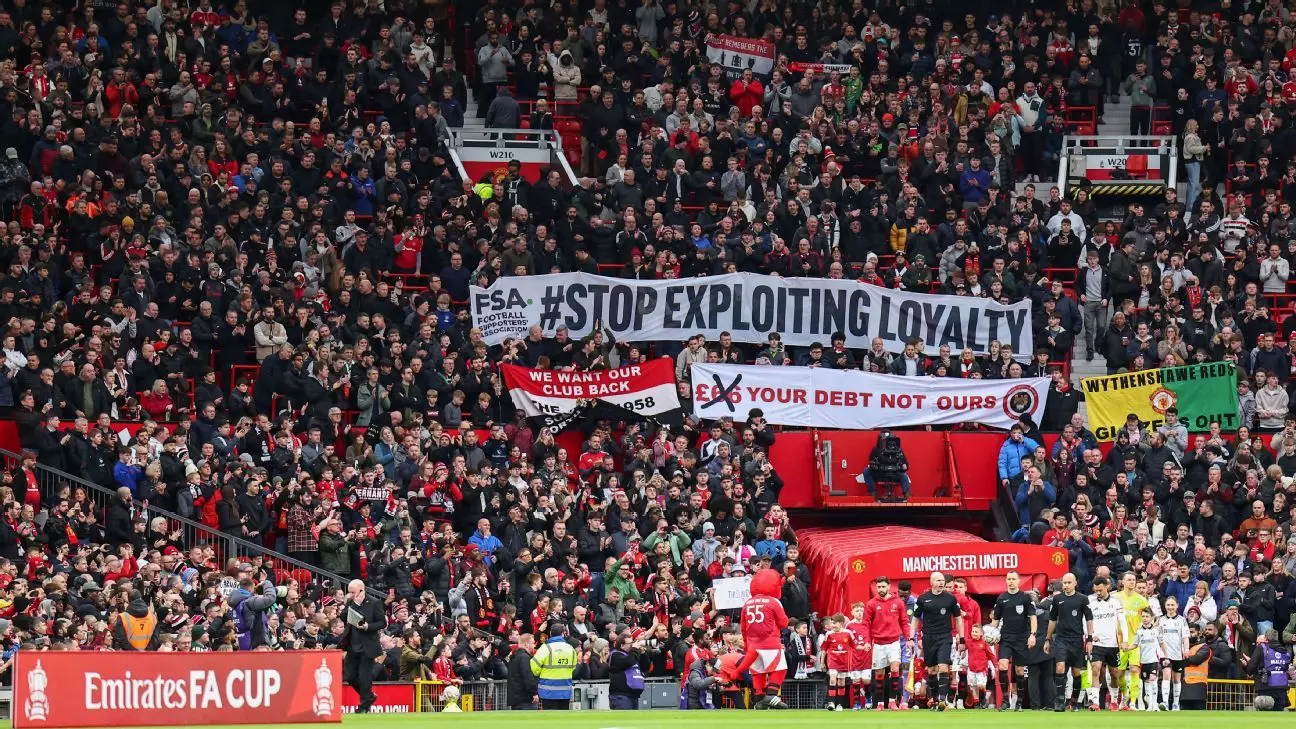The tension surrounding Manchester United reverberates through its vast fanbase, particularly as discontent grows towards the Glazer family’s ownership. In a dramatic turn, one of the club’s most influential supporter organizations, “The 1958,” is rallying fans to don black attire during the upcoming match against Arsenal at Old Trafford. This movement is symptomatic of larger grievances regarding the financial despair enveloping the club and its current trajectory.
Manchester United is a name steeped in dignity and success within the footballing world. However, as time progresses, that esteemed reputation is shadowed by alarming financial reports and underwhelming performances. The club’s financial results for the 2023-24 season revealed a staggering net loss of $144 million, which has ignited fears regarding the sustainability of operations and strategic direction. Furthermore, the recent payout of £14.5 million (equivalent to around $18.2 million) for redundancies, including manager Erik ten Hag and his coaching staff, adds fuel to the fire of criticism aimed at the current administration.
This troubling financial landscape is compounded by severe debt obligations, with interest payments totaling £18.8 million in the last half-year alone. Such figures underscore a broader narrative that paints the club’s financial management as inadequate, further alienating loyal supporters. Replacing Ten Hag with Ruben Amorim has not produced the desired turnaround, leading to a resounding defeat in a penalty shootout against Fulham during the FA Cup, which compounded feelings of disillusionment.
The Historical Context of Discontent
To fully grasp the present situation, one must consider the historical undercurrents that have shaped the club’s relationship with its supporters. The Glazer family’s acquisition of Manchester United through a leveraged buyout in May 2005 has been marred by persistent backlash from fans who feel betrayed. The introduction of over £500 million in debt as a result of this takeover has bred resentment among a fanbase that celebrated the club’s former financial independence.
For nearly two decades now, supporters have viewed the Glazers’ ownership as detrimental to the club’s ethos and stability. The recent announcement of a coordinated protest march before the Arsenal match showcases the intensity of this animosity, marking a continuation of protests from the previous week. This moment reflects not just dissatisfaction with financial management or team performance, but a deeper yearning for the rapid return of a club that exists for its fans, rather than as a commercial entity.
The call to arms by The 1958 resonates deeply within the heart of Old Trafford’s illustrious walls. The organization’s statement emphasizes the need for fans to unite against what they perceive as an existential threat to their club. The anguish is palpable: “The club is slowly dying before our eyes,” said Steve Crompton, highlighting the urgency of their plea. Supporters are asked to converge at 3 p.m. on match day, adorned in black, as a visual testament to their disapproval of the Glazers’ reign.
In an age where football has increasingly become interwoven with commercial interests, such grassroots movements highlight a yearning for the restoration of fan culture. The insistence on maintaining a relationship between supporters and the club underscores a desire for accountability and respect for the historical legacy of Manchester United.
In sum, the impending protest represents more than a rally against ticket prices or ownership grievances; it signifies a broader struggle for the future identity of Manchester United. With the current trajectory showing rates of deterioration rather than improvement, time is of the essence for fans and organizations like The 1958. As discontent reaches a fever pitch, the footballing world watches closely to see if these appeals for change might finally spark a turnaround for one of the sport’s most storied institutions.
As Manchester United faces both institutional and existential crises, the course of action taken by supporters may prove crucial in shaping the future trajectory of the club, galvanizing them towards a collective aim of reclaiming their beloved institution.


Leave a Reply